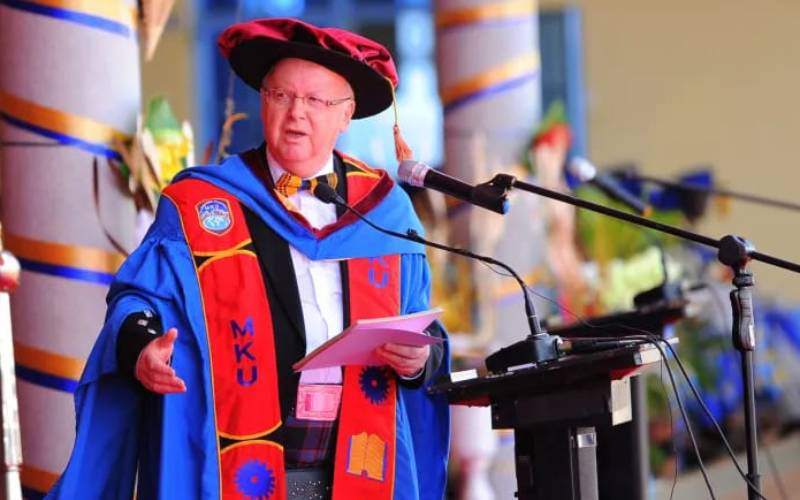
Mount Kenya University (MKU) has unveiled new AI-driven academic programmes and digital systems to revolutionise teaching, learning, and management.
By committing to AI-led education and operations, MKU joins a growing global movement in higher learning one that prepares students not just to participate in the Fourth Industrial Revolution but to lead it.
The announcements were made on Friday, August 8, during the university’s 27th graduation ceremony, themed “Catalysing Innovation: Universities as Drivers of Artificial Intelligence.”
Vice Chancellor Prof. Deogratius Jaganyi said the university has placed Artificial Intelligence (AI) at the centre of its academic and operational transformation.
Prof Jaganyi noted that this reflects in its renewed strategic direction embedding AI into every aspect of the university’s curricula and operations to prepare graduates for a rapidly evolving global economy.
“Our graduation theme today precisely captures the University’s envisaged strategic direction. We are rethinking our entire curriculum to ensure all programmes embrace AI attributes, enhancing pedagogy for better educational outcomes,” Prof Jaganyi said.
As part of this shift, the University Council has approved 13 new and revised programmes, including flagship offerings such as the Master of Data Science and Artificial Intelligence and the Bachelor of Science in Data Science and Artificial Intelligence, both to be offered in the School of Computing and Informatics.
More than 6,000 graduands including 5,447 with bachelor’s degrees, 691 with master’s degrees, and 10 with doctorates received their awards at the ceremony. Among them were 86 students from the Equip Africa Institute, MKU’s Kitale-based affiliate specialising in healthcare training.
Dr Vincent Gaitho, Chair of MKU Council, said AI will play a pivotal role in enhancing operational efficiency, supporting faculty-led research, and enabling data-driven decision-making across the institution.
“An integration of AI into core systems and processes streamlines operations and strengthens service delivery,” Dr Gaitho said.
“Our AI-integrated ICT system, the University Integrated Resource Platform (UnIRP), will be a major catalyst in our digital transformation journey, ensuring real-time monitoring and management of key academic and administrative functions.”
The custom-built UnIRP platform is designed to boost student experience, strengthen research capacity, and enable greater engagement between students and faculty.
Dr Tonny Omwansa, CEO of the Kenya National Innovation Agency (KENIA), commended MKU’s AI focus, saying it placed the university among the country’s key drivers of socio-economic transformation.
“The theme of MKU’s 27th Graduation recognizes that universities like MKU are not just consumers of trends but catalysts of trends shaping socio-economic development,” Dr Omwansa said.
“You stand at the frontier of a new era. With AI, you can not only innovate, but you can transform lives.”
Stay informed. Subscribe to our newsletter
He urged graduands to seize the opportunities offered by AI, citing examples of young innovators already creating social impact through technology.







